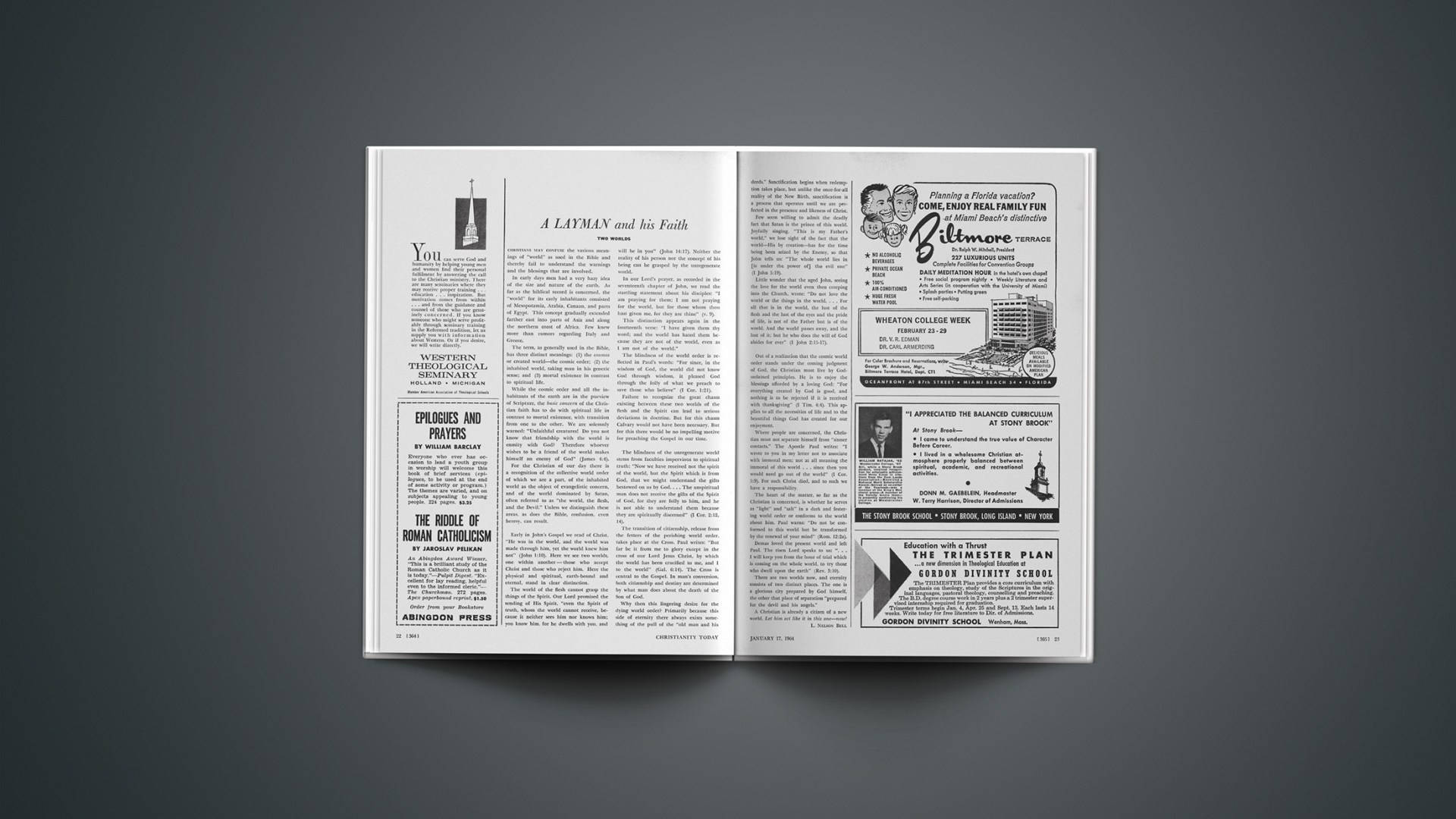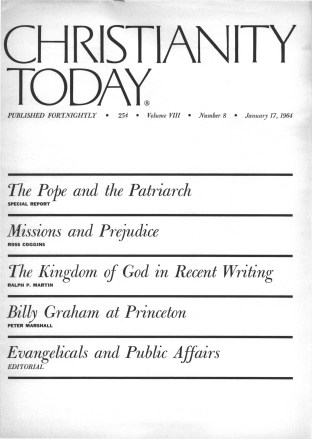Christians may confuse the various meanings of “world” as used in the Bible and thereby fail to understand the warnings and the blessings that are involved.
In early days men had a very hazy idea of the size and nature of the earth. As far as the biblical record is concerned, the “world” for its early inhabitants consisted of Mesopotamia, Arabia, Canaan, and parts of Egypt. This concept gradually extended farther east into parts of Asia and along the northern coast of Africa. Few knew more than rumors regarding Italy and Greece.
The term, as generally used in the Bible, has three distinct meanings: (1) the cosmos or created world—the cosmic order; (2) the inhabited world, taking man in his generic sense; and (3) mortal existence in contrast to spiritual life.
While the cosmic order and all the inhabitants of the earth are in the purview of Scripture, the basic concern of the Christian faith has to do with spiritual life in contrast to mortal existence, with transition from one to the other. We are solemnly warned: “Unfaithful creatures! Do you not know that friendship with the world is enmity with God? Therefore whoever wishes to be a friend of the world makes himself an enemy of God” (James 4:4).
For the Christian of our day there is a recognition of the collective world order of which we are a part, of the inhabited world as the object of evangelistic concern, and of the world dominated by Satan, often referred to as “the world, the flesh, and the Devil.” Unless we distinguish these areas, as does the Bible, confusion, even heresy, can result.
Early in John’s Gospel we read of Christ, “He was in the world, and the world was made through him, yet the world knew him not” (John 1:10). Here we see two worlds, one within another—those who accept Christ and those who reject him. Here the physical and spiritual, earth-bound and eternal, stand in clear distinction.
The world of the flesh cannot grasp the things of the Spirit. Our Lord promised the sending of His Spirit, “even the Spirit of truth, whom the world cannot receive, because it neither sees him nor knows him; you know him, for he dwells with you, and will be in you” (John 14:17). Neither the reality of his person nor the concept of his being can be grasped by the unregenerate world.
In our Lord’s prayer, as recorded in the seventeenth chapter of John, we read the startling statement about his disciples: “I am praying for them; I am not praying for the world, but for those whom thou hast given me, for they are thine” (v. 9).
This distinction appears again in the fourteenth verse: “I have given them thy word; and the world has hated them because they are not of the world, even as I am not of the world.”
The blindness of the world order is reflected in Paul’s words: “For since, in the wisdom of God, the world did not know God through wisdom, it pleased God through the folly of what we preach to save those who believe” (1 Cor. 1:21).
Failure to recognize the great chasm existing between these two worlds of the flesh and the Spirit can lead to serious deviations in doctrine. But for this chasm Calvary would not have been necessary. But for this there would be no impelling motive for preaching the Gospel in our time.
The blindness of the unregenerate world stems from faculties impervious to spiritual truth: “Now we have received not the spirit of the world, but the Spirit which is from God, that we might understand the gifts bestowed on us by God.… The unspiritual man does not receive the gifts of the Spirit of God, for they are folly to him, and he is not able to understand them because they are spiritually discerned” (1 Cor. 2:12, 14).
The transition of citizenship, release from the fetters of the perishing world order, takes place at the Cross. Paul writes: “But far be it from me to glory except in the cross of our Lord Jesus Christ, by which the world has been crucified to me, and I to the world” (Gal. 6:14). The Cross is central to the Gospel. In man’s conversion, both citizenship and destiny are determined by what man does about the death of the Son of God.
Why then this lingering desire for the dying world order? Primarily because this side of eternity there always exists something of the pull of the “old man and his deeds.” Sanctification begins when redemption takes place, but unlike the once-for-all reality of the New Birth, sanctification is a process that operates until we are perfected in the presence and likeness of Christ.
Few seem willing to admit the deadly fact that Satan is the prince of this world. Joyfully singing, “This is my Father’s world,” we lose sight of the fact that the world—His by creation—has for the time being been seized by the Enemy, so that John tells us: “The whole world lies in [is under the power of] the evil one” (1 John 5:19).
Little wonder that the aged John, seeing the love for the world even then creeping into the Church, wrote: “Do not love the world or the things in the world.… For all that is in the world, the lust of the flesh and the lust of the eyes and the pride of life, is not of the Father but is of the world. And the world passes away, and the lust of it; but he who does the will of God abides for ever” (1 John 2:15–17).
Out of a realization that the cosmic world order stands under the coming judgment of God, the Christian must live by God-ordained principles. He is to enjoy the blessings afforded by a loving God: “For everything created by God is good, and nothing is to be rejected if it is received with thanksgiving” (1 Tim. 4:4). This applies to all the necessities of life and to the beautiful things God has created for our enjoyment.
Where people are concerned, the Christian must not separate himself from “sinner contacts.” The Apostle Paul writes: “I wrote to you in my letter not to associate with immoral men; not at all meaning the immoral of this world … since then you would need go out of the world” (1 Cor. 5:9). For such Christ died, and to such we have a responsibility.
The heart of the matter, so far as the Christian is concerned, is whether he serves as “light” and “salt” in a dark and festering world order or conforms to the world about him. Paul warns: “Do not be conformed to this world but be transformed by the renewal of your mind” (Rom. 12:2a).
Demas loved the present world and left Paul. The risen Lord speaks to us: “… I will keep you from the hour of trial which is coming on the whole world, to try those who dwell upon the earth” (Rev. 3:10).
There are two worlds now, and eternity consists of two distinct places. The one is a glorious city prepared by God himself, the other that place of separation “prepared for the devil and his angels.”
A Christian is already a citizen of a new world. Let him act like it in this one—now!










